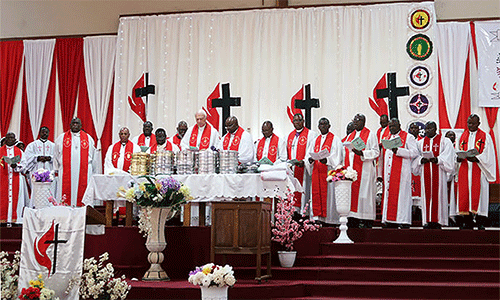The meeting was attended by 11 active bishops from the African continent, as well as by Sierra Leone Conference interim Bishop Warner Brown, retired Bishops David Yemba and Ntambo Nkulu Ntanda, Bishop Gregory V. Palmer of the West Ohio Conference and Council of Bishops president Thomas J. Bickerton.
“We discussed the future of The United Methodist Church in a wider context and had conversations on regionalization,” said Bishop Eben K. Nhiwatiwa of the Zimbabwe Episcopal Area who is the president of the three African colleges.
Your support of the Episcopal Fund apportionment helps pay the salaries and benefits of United Methodist Bishops and allows them to travel across their episcopal areas providing mentorship and leadership.
Regionalization plans foresee a new approach to governing The United Methodist Church, replacing the current central conferences and designating the entire U.S. as a regional conference.

Advocates for regionalization in The United Methodist Church say it would give Africa, Europe, the Philippines and the U.S. equal standing in church decision-making. They also say it would help with missional effectiveness, allowing for more emphasis on the local context.
“We received some ideas about regionalization through the Connectional Table and we believe regionalism was probably with us for some time when we look at the existing central conferences, which were a way of recognizing different regions of the world,” Nhiwatiwa said.
Judi Kenaston of the Connectional Table had the opportunity to address the episcopal leaders and shed some light on the General Conference petition on regionalization.
She said there had been proposals for regionalization since the 1930s and it is not true that proposed legislation would allow different definitions of marriage.
“The regions will only be able to adapt the parts of the Discipline that are adaptable,” Kenaston said. “However, (regionalization) might allow a region to determine the way the church in its region can minister to people as they are affected by the laws of the region.”
The bishops’ gathering was notable, in part, because of Bickerton’s presence. Nhiwatiwa was asked to comment on what it was like to have the Council of Bishops president present for discussions.
“The COB president has his personality of being open, he has that gift. He is a person who wants to avail himself to the different units of the church while he is leading as the president of the council,” he said.
Last year, Bickerton joined the African leaders virtually when they held their meeting at Africa University in Zimbabwe.
“He was here (this time) in person. It’s not easy, but he did that,” Nhiwatiwa said. “We take that as a way that the president and the council and maybe the whole church are recognizing that Africa is a critical component of the church and that it brings something very healthy in the life of our denomination.”
excerpt from a story by Eveline Chikwanah, correspondent for UM News based in Harare, Zimbabwe.
One of seven apportioned giving opportunities of The United Methodist Church, the Episcopal Fund pays for bishops’ salaries, office and travel expenses, and pension and health-benefit coverage. Please encourage your leaders and congregations to support the Episcopal Fund apportionment at 100 percent.





